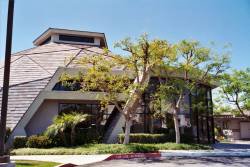
By David Haldane, Times Staff Writer
(October 24, 2005)
There's an Irvine house of worship that changes religions at least once a week.
Irvine United Congregational Church sports golden crosses for Sunday morning services. Jewish High Holidays see it transformed into a sanctuary for Congregation Kol HaNeshamah, filled with Torahs, ram's horns and yarmulkes. And Friday afternoons, worshipers carefully unroll prayer rugs onto the floor of what becomes the United Mosques of Irvine.
"Our theology is inclusive," says the Rev. Steven Swope, acting minister of the Christian congregation that owns the church. He believes it is one of the few of its kind in the nation with a tripartite arrangement.
"Jesus is our way," he said, "but other people have other ways. This is our way of living that out."
Almost immediately, the two congregations developed a relationship much closer than landlord and tenant. To make the Jews feel welcome, church members removed an image of the Madonna and Child from the sanctuary wall and replaced it with a depiction of the Garden of Eden hung by both congregations. Then, in a gesture that melted Jewish hearts, the Christians invited the newcomers to observe the ancient Jewish custom of posting a mezuza — a miniature ark containing Hebrew prayers — on the doorpost of the church.
University Synagogue, which held weekly services at the church, was joined for Rosh Hashana and Yom Kippur by Kol HaNeshamah (Voice of the Soul), another congregation.
"It's brotherhood and sisterhood, the unity rather than the differences," said Howard Goldman, co-president of Congregation Kol HaNeshamah. "You have to feel the bond. God is located in the relationship between people."
In 2000, the Christians and the Jews opened the doors of the church to the United Mosques of Irvine."
We all have one God," said Mir-Javid Jalali, 64, a retired physicist and entrepreneur who came from Iran 36 years ago and is referred to affectionately by his congregants as "Dr. J." Although he does not call himself an imam, Jalali leads the small congregation of about 20 in prayer, delivers the Friday sermons and oversees the mosque's operation inside the church. "Being in the same mosque with different religions allows us to narrow the gap."
The generosity of spirit evidenced in such broadminded actions may be rooted in more than a mere Christian charity. According to the church's web site, http://www.iucc.org/, they view themselves as . . . "Guided by God's unconditional love, we are an open and affirming congregation. We are committed to being progressive and intentionally inclusive, welcoming all people as fellow children of God. Our doors and our hearts are open to all wishing to join us in worship and in our faith journey. We strive to create a vital community of God as we care for one another."
In what stands as the understatement of the day, they aver: "This congregation's spiritual values are not wrapped in religious dogma. We believe that no one religious tradition has a monopoly on the truth, and we assume that all faiths have gained some insight into the human condition and our connection with the Creator. We are on a journey toward a faith relationship with God, and each of us is following his/her own pathway. We believe that the wisdom of Jesus' teachings calls us to look inside ourselves, to struggle with the questions of who we are and why we are here, and to create an environment that fosters personal insight. In so doing, we learn to celebrate the divine spark that resides within each of us." Certainly no surplus of dogma was evident in that vision statement.
Irvine United Congregational Church also boasts an interesting, albeit consistent, educational philosophy. They cite Sydney Harris as saying: "The primary purpose of a liberal education is to make one's mind a pleasant place to spend one's leisure."
Do you think that this account carries any implications for American Baptists who begin to adopt mediating and waffling stances regarding biblical authority?

No comments:
Post a Comment